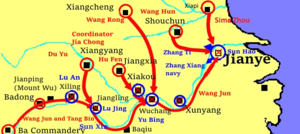Conquest of Wu by Jin
| Conquest of Wu by Jin | |||||||
|---|---|---|---|---|---|---|---|
| Part of the wars of the Three Kingdoms period | |||||||
 A map showing the Jin conquest of Wu |
|||||||
|
|||||||
| Belligerents | |||||||
| Jin Dynasty | Eastern Wu | ||||||
| Commanders and leaders | |||||||
|
Jia Chong Wang Jun Du Yu Hu Fen |
Sun Hao Zhang Ti † |
||||||
| Strength | |||||||
| 200,000+ | 230,000+ | ||||||
| Casualties and losses | |||||||
| 15,000 | |||||||
| Conquest of Wu by Jin | |||||||
| Traditional Chinese | 晉滅吳之戰 | ||||||
|---|---|---|---|---|---|---|---|
| Simplified Chinese | 晋灭吴之战 | ||||||
|
|||||||
| Transcriptions | |
|---|---|
| Standard Mandarin | |
| Hanyu Pinyin | Jìn Miè Wú Zhī Zhàn |
The conquest of Wu by Jin was a military campaign launched by the Jin Dynasty against the state of Eastern Wu in 280 towards the end of the Three Kingdoms period of Chinese history. The campaign concluded with the fall of Wu and the reunification of China under the Jin Dynasty.
As early as 262, Cao Wei regent Sima Zhao planned the first outline for the conquest of Wei's rival states, Eastern Wu and Shu Han, by eliminating Shu first, then take on Wu three years later. However, the conquest of Shu in the following year severely strained Wei's resources and Wei desperately needed time to recover. Compounding the problem, Wei lacked an adequate naval force required for the campaign on Wu. Sima Zhao therefore postponed the planned conquest of Wu and started to consolidate power in Wei first. In 265, Sima Zhao died and was succeeded by his son, Sima Yan. In the same year, Sima Yan forced the last Wei emperor, Cao Huan, to abdicate, and proclaimed himself Emperor of the Jin Dynasty. By then, only Wu was left of the Three Kingdoms.
In comparison with Wei and the subsequent Jin Dynasty, Wu experienced greater problems of its own: the succession from the third Wu emperor, Sun Xiu, was marred with bloodshed and internal conflict. Sun Xiu's successor, Sun Hao, was a tyrant who made little effort to prepare for the imminent invasion by the Jin Dynasty. Sun Hao's rule was more harsh as compared to the later part of the reign of Sun Quan, Wu's founding emperor. This caused a continuous wave of peasant uprisings and military mutinies, which mainly took place in present-day Zhejiang and Guangdong. Not only did Sun Hao refuse to accept advice to strengthen Wu's defenses and reduce the burden on its people, he also executed around four dozen high-ranking officials who provided good counsel on governance. As a result, the Wu imperial court had already lost the popular support of the people, and many regional commanders stationed at the border defected to the Jin Dynasty.
...
Wikipedia
